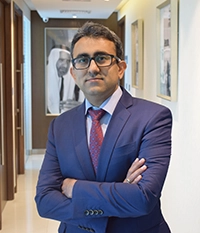
Ganesh Ramaswamy
Partner at K Rangamani and Associates LLP, Global Tax Group Regional Director, Asia Pacific
Ganesh has extensive experience of more than 30 years in providing specialist tax services, particularly to large privately owned groups, with particular strengths in the property, retail, healthcare and hospitality industries. He has supported various entities with specialist advice on tax-effective structures and restructures, cross-border transactions on account of outbound and inbound India investments, mergers, acquisitions and divestments. Ganesh has also worked with stakeholders across businesses to deliver solutions such as tax due diligence, tax consolidation and restructuring of large family businesses in the Middle East, Asia, and Singapore.

Surandar Jesrani is the CEO and Managing Partner at MMJS Consulting. A chartered accountant by qualification and entrepreneur by nature, Surandar prior to founding MMJS was in key positions at HSBC Private Equity, Infosys, L&T and GM.
Surandar is a thought leader and the leading newspapers in the region frequently seek his views. Surandar is a speaker at various International forums and was recognized as ‘Corporate Icon of the Year’ for three consecutive years.
The impact of OECD two-pillar solution on GCC countries
December 5, 2022
The Accountant Magazine recently highlighted the impact of the OECD two-pillar solution to control impact of BEPS on GCC (Gulf Co-operation Council) countries. Two tax experts from Kreston Global, Ganesh Ramaswamy, Partner at K Rangamani and Associates LLP in India and Surandar Jesrani of Kreston Menon shared their thoughts with The Accountant on the region’s readiness to adopt the new framework.
Tax digitalisation
As the global economy becomes increasingly more digitalized, the OECD made the decision to update the framework on base erosion and profit sharing. Pillar one impacts the multi-national enterprise (MNE) with a turnover of more than 20 billion and profits before tax of over 10%. Pillar two is seeking a global tax rate of at least 15%.
The impact of OECD inclusive framework on the GCC
Parts of the region have been in a position to be able to adopt the pillar two framework with relative ease. Multiple countries within the GCC are already positioned to be able to adopt the 15% tax rate, with Oman already in that position. A 15% corporate tax rate exists for non-GCC companies in Kuwait with Saudi Arabia already exceeding the expectations at 20%. Bahrain and UAE currently have no corporate tax structure and are considering how to implement it.
Bahrain and UAE corporate tax announcements
UAE will meet obligations by introducing corporate tax in June 2023. This is a step-change for the country, however, guidance is yet to be issued with details of how that might affect businesses in the country. Bahrain has not yet made a full announcement, but is expected to follow the UAE in its adoption of pillar two principles.
Saudi, Kuwait and Qatar to update corporate tax policies
Saudi is seeking to make changes, considering the removal of the Zakat tax, with Qatar and Kuwait adopting corporate tax for GCC and non-GCC entities. In order to control BEPs within the GCC region, five of the six countries within the region will be adopting the OECD’s BEPs 2021 framework update. Kuwait is yet to confirm participation.

